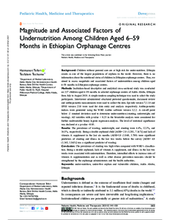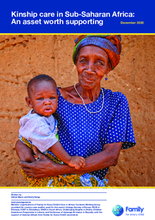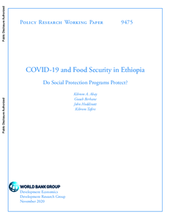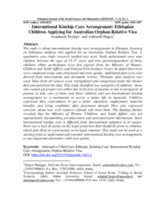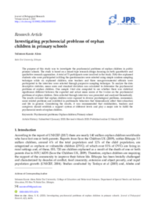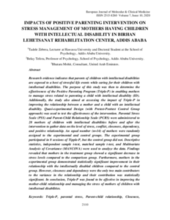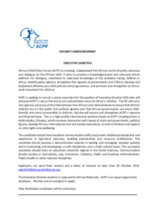childrens_living_arrangement
children_living_without_bio
Displaying 21 - 30 of 158
This study aimed to assess magnitude and associated factors of undernutrition among children aged 6–59 months in Ethiopian orphanage centres.
This paper argues that kinship care – the care of children by relatives or friends of the family – represents the greatest resource available for meeting the needs of girls and boys who are orphaned or otherwise live apart from their parents.
This paper assesses the impact of Ethiopia's flagship social protection program, the Productive Safety Net Program on the adverse impacts of the COVID-19 pandemic on the food and nutrition security of households, mothers, and children.
This study is about international kinship care arrangements in Ethiopia, focusing on Ethiopian children who applied for an Australian Orphan Relative Visa.
In this online event, Family for Every Child members FSCE (Ethiopia), The Mulberry Bush (UK), Praajak (India) and CSID (Bangladesh) discussed children's care in the context of COVID-19.
The purpose of this study was to investigate the psychosocial problems of orphan children in public primary schools in Ethiopia.
Vulnerable children and families need a strong social support network that acts as a safety net to effectively and sustainably respond to the situation of children and families at risk.
The purpose of this study was to determine the effectiveness of the Positive Parenting Program (Triple-P) in enabling mothers to manage stress related to parenting a child with intellectual disability (ID).
The authors of this study conducted qualitative interviews of 69 caregivers in four countries: Ethiopia, Kenya, Cambodia, and India (Hyderabad and Nagaland), and across four religious traditions: Christian (Orthodox, Roman Catholic, and Protestant), Muslim, Buddhist, and Hindu. They asked respondents to describe the importance of religion for their becoming a caregiver, the way in which religion has helped them make sense of why children are orphans, and how religion helps them face the challenges of their occupation.
ACPF is seeking to recruit a senior executive for the position of Executive Director (ED) who will enhance ACPF’s role as the moral and authoritative voice for Africa’s children.

